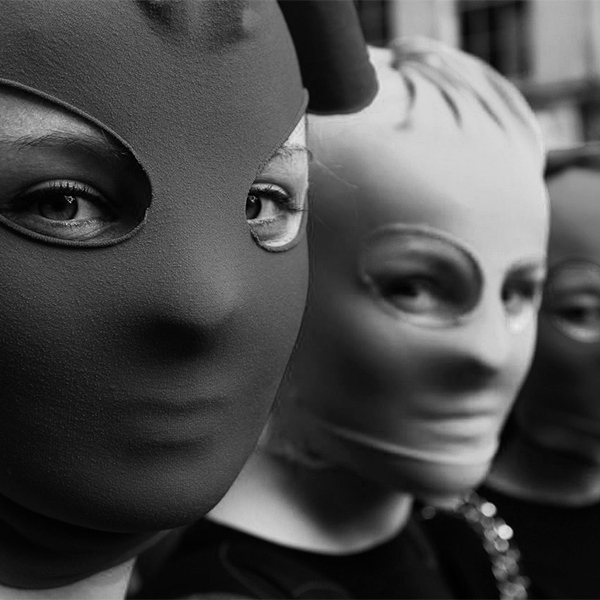Written by Jenna Dreisenstock
“Sometimes I regret it’s not 1937.”
This admission by a Russian police officer, captured in recording as members of the punk activist music collective Pussy Riot find themselves detained after their demonstration during the FIFA World Cup final is frightening to say the least. 1937 refers to the period in Russian history in which dictator Joseph Stalin had rose to power in Russia (otherwise known then as the USSR) as a dictator. 1936 -1938 is known as The Great Purge, in which Stalin cracked down on free-speech, media, political figures and privacy. This included executions of anyone that Stalin found threatening to his cause, murdering political prisoners or opponents and those ‘guilty of treason‘, with widespread surveillance keeping the USSR population in line – even if it meant severe brutality for its own people.
During the FIFA World Cup final on Sunday the 15th of July, members of the activist group managed to storm the sports field, wearing fake police uniforms in a demonstration regarding Russia’s crimes against free speech, human rights and political prisoners. Eventually dragged off the field, where the four protesters were detained and now officially jailed for 15 days, their goal was to highlight the way in which police misconduct, surveillance and brutality affect people’s lives. An extremely bold move, I struggle to fathom just how many people were watching as Pussy Riot members protested in this way, and what statement this made to not only fellow Russians and their politics, but to those around the world as well.
In this regard, I would like to pose the question – how much responsibility do those partaking in the arts, and those in the public eye have to speak out against injustice? Whether this includes boycotting venues, managers, collaborative acts – labels or even from performing in certain countries in response to political issues – where is the line between the art, the artist and the roles they play in politics?
We certainly can’t hold every artist and musician to a standard in which we expect them to speak out about politics, whether it’s from their own views or expecting ideologies to always be present in their music. Not all types of art forms need to be political – aesthetic, dynamic and tone are an equally important part of the music and art world. I am specifically referring to the music world here (but I do find this very strongly applies to film and actors as well) – do these public figures have a responsibility to speak out against injustices when they are presented with an active role to do so: even if it means jeopardizing an opportunity for them, exposure or even criticism from listeners?
It’s important to remember that silence makes a statement. Silence in response to injustice, is crucial in the continuation of oppression. If nobody says or does anything, if these injustices are not explicitly condemned – that already gives us an answer as to where someone stands on the issue and creates a blockage for progress. Therefore, if we examine a hypothetical situation in which a musician is asked to play a festival, yet the festival has been criticised for unjust behaviour: or further yet, asked to play in a country with controversial oppressive regimes such as Russia or Israel – is it their responsibility to make a specific statement when either choosing to, or refusing to play? In this there are many questions as well – if an LGBTQ artist is presented with an opportunity to play a festival in Russia, does this mean they are making a statement against Russia’s anti-LGBTQ law simply with their presence, and reminding LGBTQ folks in the Russia they are not alone and deserve to still see their favourite musicians: or does that mean the artist is actively then supporting Russia, when rather boycotting them would make a separate statement by refusing to participate? It’s a complicated subject that then, as like many similar issues spirals further: does this musician have an obligation to view where they play in this political context and speak out against it? Are we being too hypercritical and restrictive to expect each artist to make a political statement of some kind even if that is not the intent with their music? Then we have the age old question of personal political views – where is the line between the artist and their work – is it possible to still enjoy and celebrate the work of an artist who has proved themselves to have toxic political views?
In this case, how much ‘political’ accountability is fairly expected from those who create music (media) and what should our response be? We need to examine not only the ways in which public figures react to serious issues, but also look at the ways in which we consume and talk about media. If we were examine each piece of media for problematic elements in media and boycott all of it, in this society we’d essentially having nothing left! However, the ways in which we consume media is ultimately connected to who and what we’re supporting – and while we can obviously still enjoy something despite certain political issues, it’s exceptionally important for us to understand the extent of these issues and critique these problematic elements publicly: calling them out, as media shapes and molds our collective perspectives and can change the way in which society is structured. Do those in the spotlight then have an obligation to speak out against political injustice, or is it unfair for us to expect artists to delve into the controversial difficulties of societal issues and show us where they stand?




